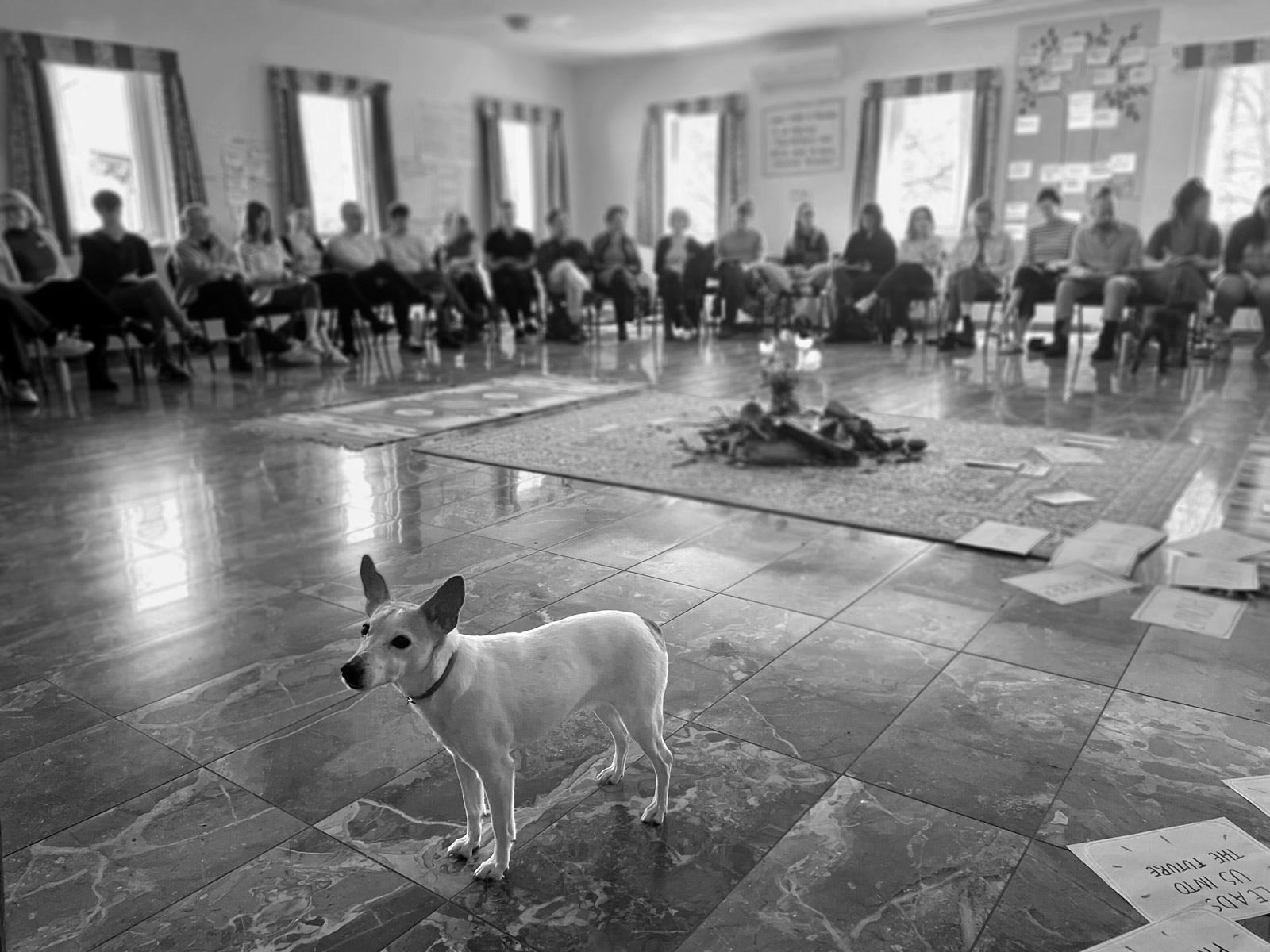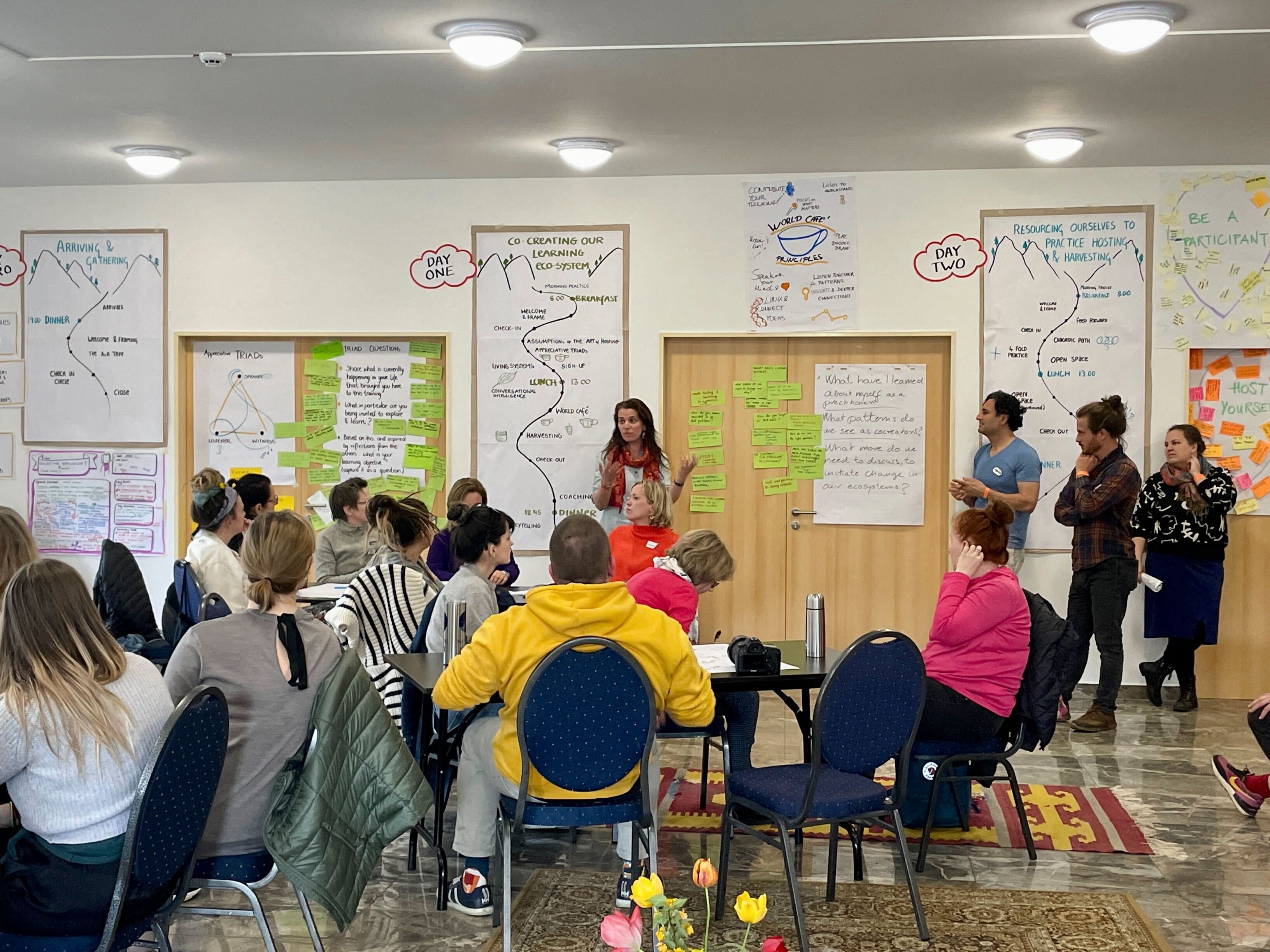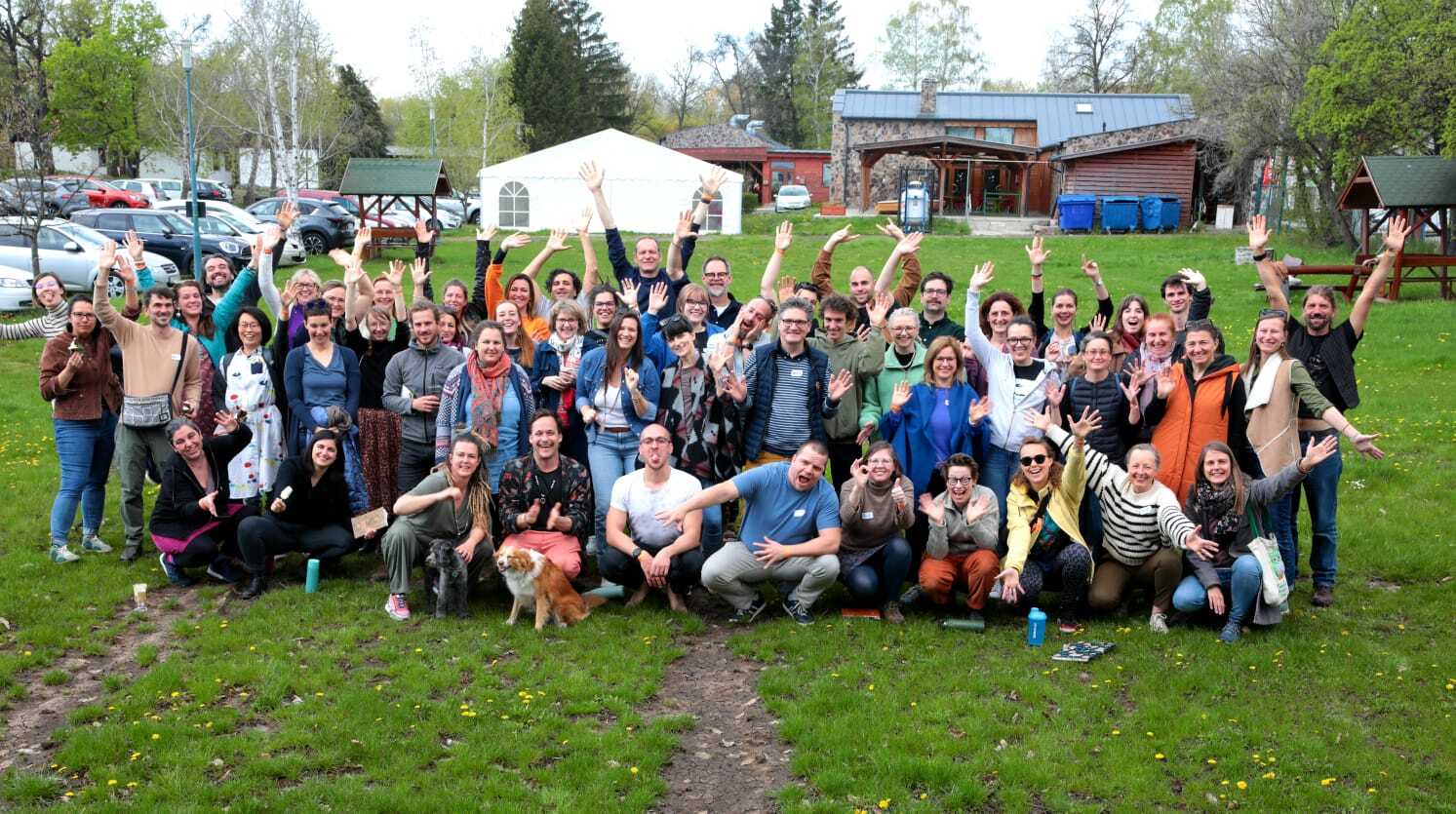Campfires and Collective Wisdom: Rethinking Leadership as Hosting
“This is a lot of hugging.”
Is not a thought I expected to have at a facilitator training session.
Tomomi, my long time colleague and AQ partner, had proposed we experience the Art of Hosting (AoH) training in Hungary to reboot an annual ritual started once we were based in different continents— meeting somewhere in Europe, take in some work related experience, reflect on the content, and think about the future of AQ while exploring the city. And local environment.
Art of Hosting had been on her radar for a while, having used its tools and practices to organize a successful research retreat. She was also eager for me to meet Melinda Várfi, a collaborator who led the training.
I had grown weary of facilitation and workshops under Covid. While Tomomi had leaned into the opportunity to expand her repertoire, I struggled to find enjoyment or proficiency in the work once it had moved online. After avoiding and ignoring it for a few years, the timing felt right to reopen that drawer and try something new.

Art of Hosting
After a few days sightseeing in Budapest, we drove to the camp site where the training was held, settled into our cabins, and gathered with 50 others for the Opening Circle.
From the start, there was a lot about Art of Hosting that felt different than any training or workshop I’d experienced before. The conversation and the space had a physical and thematic center. There was a calling question. There was a talking stick. Each participant brought their own sense of purpose, and shared it with others.
Though AoH training is open to all, the Hungary gathering attracted many changemakers from social work fields trying to support their capacity to make an impact within large groups of diverse stakeholders and complex bureaucracies. Participants who have dedicated their careers to human health and human rights brought with them a set of problems and stakes very different from my work in product design.
The training invited us to apply our newly acquired skills to help each other find a new strategy or path forward towards our respective and very real goals. A sense of mutual duty and trust quieted much of the social situating I sometimes experience at work events, clearing my mind to focus on learning and forming lasting memories. The intensity of active listening, the evening fireside singalongs, and yes the hugging all felt essential to any growth that was possible.
A year later, here are some of the concepts that remain top of mind:
- Hosting begins with how we invite participants to gather, and good hosting articulates the "why" in the invitation. Participants agree to gather for that specific why.
- Hosting requires tending to our own needs ("hosting yourself") which requires the support of others (“never host alone")
- AoH starts from a belief in the collective wisdom and capabilities of those who gather ("whoever shows up are the right people")
Preparing the field
Not long after I returned to Tokyo, a new designer, Amelie, was scheduled to join the studio.
Responsible for her onboarding, I opened the usual set of templates and materials, and with my newfound AoH lens, found them deeply lacking insight into the very human, social moment to come.
So, I decided we would do something different. Drawing from my training, I spend time "preparing the field,” in AoH lingo, the work that organizers put in at the beginning, before conversations have even started happening, affecting the quality of the outcomes. This meant reflecting on past onboardings. What signals were missed? What was misunderstood? Whose needs were forwarded and whose were neglected? What stories did each member start to write? And what were the outcomes of all this?
Then, I considered the significance of the moment. What did it mean to me and the studio to have this particular person joining at this particular time? What new opportunities did this present for every member of the team? What change was possible?
After I'd written out everything for myself, I crafted an invitation to all members of AQ. I shared my understanding of the moment, and I explained that I wanted to gather to have a conversation about what we wanted the onboarding experience to be like for ourselves and for Amelie.
Rather than sharing an agenda, I posed a ‘calling question’ to focus attention on what mattered most.
Making the agenda and to-do list part of the harvest
When we met in person, the group naturally surfaced ideas about what needed to be discussed and in what order. Rather than impose a rigid structure, we accessed the collective wisdom in the room, and I gained new perspectives on onboarding that I hadn’t considered before.
As the conversation progressed, the team collaboratively built a list of action items. Each member volunteered to take responsibility for specific tasks, ensuring the ideas from the meeting could be carried forward in practical ways. For example, one member pointed out that this would be Amelie’s first time living in Tokyo. They suggested that experiencing the city together would be a nice way to welcome her and offered to organize a neighborhood tour.
Once Amelie joined, she saw the collective effort in action and had the opportunity to shape her own onboarding, strengthening the team’s shared ownership of the process.
Recognizing that the most important work happens beforehand
This marked the first time I approached a new member joining AQ with such deliberate preparation. Writing beforehand—about how I saw the moment, who we were as a studio, and what we were trying to achieve—helped to craft an invitation that established a shared sense of purpose and led to individuals finding their own meaning in the moment. The positive effects extended well beyond that initial meeting. Amelie felt right away her presence mattered to everyone, and with the help of others, was able to take an active role in her own onboarding.
Thinking like a host

Even if you never attend an Art of Hosting (AoH) training, adopting the mindset of a host can fundamentally shift how you approach pivotal moments in your organization. Hosting starts with care—care for the people you’re inviting, for the environment they’ll share, and for the quality of the experience they’ll have. A good host prepares thoughtfully but also remains present during the gathering, ready to respond to what unfolds.
It’s particularly helpful when teams face uncertainty, whether during transitions or ambiguous situations. Hosting isn’t just about structure; it’s about cultivating trust and clarity in the midst of change.
Shared Learning
Essential to the quality of Amelie’s onboarding was that I shared my AoH training experience with Tomomi. I was confident to experiment because at least one other member of AQ understood the spirit and potential of the approach, someone I could celebrate the successful application of new skills. And when I trip up or miss opportunities to apply my training, someone is there to bring this to my attention as well or help course correct.
Not every learning adventure needs to be shared, but we’ve found that immersive, perspective-changing experiences often benefit from a buddy system.

Finding out more about AoH
AoH is a decentralized community of practitioners whose tools and methods are used in diverse settings, developed through years of practice rather than certification. If you’re intrigued, you can find upcoming AoH trainings on the community’s website: artofhosting.org.

